Martin Auer: The Strange War, Stories for Peace Education

Report to the United Solar Systems' Council
Please share if you want to help to promote peace!
Translated by Kim Martin Metzger
Reviewed by Martin Auer
Bücher und CDs von Martin Auer

In meinem Haus in meinem Kopf
Gedichte für Kinder

Die Prinzessin mit dem Bart
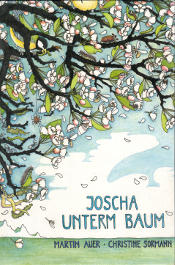 Joscha unterm Baum
Joscha unterm Baum
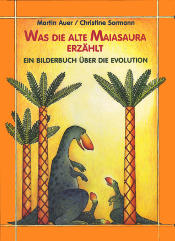
Was die alte Maiasaura erzählt

Die Erbsenprinzessin

Der wunderbare Zauberer von Oz - Hörbuch zum Download
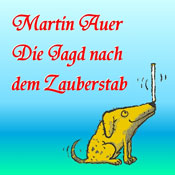
Die Jagd nach dem Zauberstab, Roman für Kinder - Hörbuch zum Download
 Der seltsame Krieg
Der seltsame KriegGeschichten über Krieg und Frieden
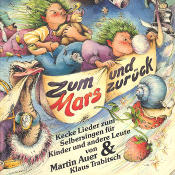
Zum Mars und zurück - Lieder
 Lieblich klingt der Gartenschlauch - Lieder
Lieblich klingt der Gartenschlauch - Lieder
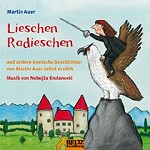
Lieschen Radieschen und andere komische Geschichten - CD
On the basis of our observations during approximately 10,000 revolutions of the planet Yer, we must urgently advise against admitting this planet and its inhabitants into the United Solar Systems.
There is a species of inhabitants on Yer that considers itself intelligent and during the last million revolutions has multiplied tremendously and spread all over the planet: the so-called Nin, Orang or Humans. This species, which originally descends from tree dwellers, does in fact consider itself intelligent, but the currently six billion Nin are incapable of coordinating their actions with each other in any sensible way. Often some of them destroy what others have created. They also take food and clothing away from each other. They do produce things that are supposed to make life easier and more pleasant for them, but in the process of producing these things, they destroy and poison their planet's atmosphere, water, and soil, and in this way they make their life infinitely more difficult. One of the worst afflictions they suffer from is a custom (or should we call it a disease?) that they call wojna, war, krieg or guerra. When a wojna breaks out, large groups of Nin set upon one another and destroy each other. They destroy the dwellings and food supplies of their "enemies," and they inflict the most terrible torture on one another. Our research team attempted to find out why they do that. In fact the Nin are themselves in complete disagreement on this matter. There are, and that is the strange thing, very many among them who reject this cruel custom and regard it as the worst misfortune that can befall Ninkind. Others to be sure love wojna. They tell stories about it or watch moving pictures about it. The Nin who reject wojna have different views on why it can come to it. Some of them consider it simply an eruption of insanity on the part of a larger group of Nin. Others believe that the Nin bear sort of two different kinds of soul within themselves, one a good one that loves the other Nin, and a bad one that hates the other Nin. Still others believe wojna is not really nice but is unfortunately necessary now and then. It often happens that two groups of Nin start a wojna with each other and each group says, "Well, we don't want this wojna, but regrettably the others are forcing us into it."
Our research team tends towards the view that the Nin's basic problem is that they are not capable of harmonizing the actions of large groups with each other. They do not yet seem to have understood at all that they are not separate individuals but are connected to each other and with all other inhabitants of the planet. To make what is meant understandable to the Nin, one could take the example of two Yer inhabitants that are called oxen by some Nin. If two of these oxen are hitched up in front of a means of transportation (referred to as wagons by some Nin) and one ox pulls towards the north but the other ox towards the west, both of them will end up in the northwest, even though neither of them actually wanted to go there. The Nin have yet not understood that they are tied to all the other six billion Nin just like the two oxen in front of the wagon. It's just that their actions are much more complicated than the pulling of a wagon, and the results of the actions of six billion Nin are of course more difficult to calculate than the path of the two oxen. It appears that so far the intelligence of the Nin has not been up to the task.
What now follows is a report made by our research team on the origin of wojna on the planet Yer. Many, many thousands of planet revolutions ago, when the Nin were still living from hunting and gathering in the forests, they had not yet come to know what wojna is. At that time, the Nin lived together in small groups and roamed through the forests. Such a group consisted of only sixty to eighty Nin, maybe ten to fifteen so-called families.
Every group had a particular hunting ground that they wandered through during the course of a year, looking for berries and fruit, mushrooms and roots, for snails and frogs, and naturally for game that they could hunt. In one area, let's say in a mountain valley, there lived only very few of these groups, maybe three or four at most. A forest cannot feed a large number of people. These Nin knew nothing of kings or chieftains, of courts of law, police, or prisons, and they also had no laws. Why should they? When someone did something that the others did not approve of, they could sit down together at the fire in the evening and talk about it. When they wanted to hunt gazelles, they followed their best hunter. But when the time came when the honey of the wild bees could be found, they followed the woman who knew the bees best. And when there was a quarrel, they followed the advice of the oldest women and men because they had the most experience. The Nin stuck together and shared everything with each other, since they could not have survived otherwise.
When a group became too large, it had to split up, and one half had to find a new hunting ground somewhere else. In those cases, it was possible for this group to enter another group's area. And then, yes, then there could be a fight. But such a fight was quickly over. Maybe it was just a big brawl. And as soon as one group ran away, the fight was over.
These fights were the exception and only happened when one group had to leave its territory. That did not happen very often because the women nursed their babies for four years or more and that kept them from having children during that time. In this way the women unknowingly prevented the group from becoming too large and maybe having to split up. Otherwise there was no reason for a fight. These Nin groups had no wish to make their hunting grounds larger and larger. They would not even be able to take advantage of a bigger hunting ground. There was also no reason to attack the neighboring group and to loot them because there was nothing to loot. The Nin of those days only kept a small stock of supplies. They lived from hand to mouth and gathered and hunted only as much as they could eat in a short amount of time. They lived in this way for hundreds of thousands of planet revolutions.
About 6,000 planet revolutions ago the climate changed in certain areas where the Nin lived. The differences between the dry and the rainy seasons became greater, and certain plants did not grow any more. And so certain animals that had lived on these plants disappeared. But certain plants, whose seed consisted of hard kernels, were able to thrive especially well in this climate. And the Nin discovered how to lavish care and attention on these plants and that in this way they could harvest much more food in a small area than if they wandered around and took what they could find. These Nin no longer wanted to wander. They set up the first villages and became farmers. But they maintained many of their hunting customs. So just as they used to hunt together, they now worked in the fields together. The land belonged to no one - or to everyone. When there were communal issues to decide the villagers got together and discussed the problem. They did not elect leaders, but when there was a certain activity that had to be organized, to clear a new section of the forest, for example, or to build a new community center, or to go on a hunt, then they asked a man or a woman who knew something about it to take the leadership. That was also the way it used to be. The men still went on the hunt for the increasingly meager game, and a large part of the work in the fields was done by the women. But since the most important food came from the fields, the women often had more say so than the men had.
Life on a farm had advantages and disadvantages. People had become dependent on grain. When they were still hunters and gatherers, it was no big deal if one kind of plant did not do well one year. There were hundreds of others in the woods. Now when a drought came they had to go hungry. Their food was also more one-sided, not much variety, so that they got bad teeth and their children stayed smaller. And the work was hard and monotonous. Life was not as varied and exciting as before. But there was no going back, if for no other reason than that hunters and gatherers need much more land than farmers do.
The new thing was that they did not live from hand to mouth anymore. They could produce more than they consumed. They could store food. Then they had something for when times were bad, a safety net for when there might be a drought or a flood. And when their stockpile was big enough they could also invest some of it in the future. That is, when they had stored enough grain, they could, for example, afford to cultivate fewer fields. Some of the people could instead dig an irrigation ditch so that in the year after the next the harvest was even more bountiful and the surplus became even larger. Then they could either make their lives more comfortable or again invest the surplus in something else. If not everyone was needed in the fields, one of them could start specializing in blacksmithing and another in pottery, and so forth and further develop these crafts that in turn made everyone's work easier later on.
They could just as well permit some of them to specialize in healing, in praying, or in writing songs. It is true that these things did not increase the surplus, but it made life for everyone more pleasant and richer. In this way, progress slowly and leisurely made its entrance. Jewelry was made; pictures were painted; and statues were carved. Songs and stories were composed; clothes became more beautiful and the dances more complicated. It was a peaceful life.
In other regions the hunters followed the herds of hoofed animals. Gazelles, deer, sheep, and goats grazed on the plains in the winter, in the highlands in the summer. The hunters followed them during their migrations. On the plains they found dates, on the slopes acorns, almonds, and pistachios. In the hills they found apples and pears. Wild grains ripened at different elevations in different seasons. The better the people became at hunting, the more selective they could be about the animals that they chose as their prey. When they mainly killed young bucks and rams and spared the female animals, the herds were better able to reproduce. The hunters killed bears, wolves, and foxes so that they would not harm the herds. They drove the herds to areas where they could better protect them. Sheep and goats were less shy than gazelles and deer, and it was easier for them to get used to the constant presence of humans. So the hunters preferred to follow them. And the hunters became shepherds. The life of the pastoral people was still very similar to the earlier life of the hunters. They still moved through their pastures during the course of a year, and they naturally still hunted animals that would not allow themselves to be tamed. Since hunting was still a man's business, the men considered the herds as their property, and so among the shepherds the word of a male Nin counted for more than the word of women did.
Shepherds and farmers naturally soon came across one another. Everybody had something that the other could use. The shepherds could get grain and bread from the farmers and pots made of clay and other things. In exchange, the farmers got meat, leather, and wild fruit and nuts. But one day a shepherd chieftain, who was also a great hunter, discovered that it was also possible to take from the farmers what he wanted, without giving them something in return. The farmers, who were no longer used to hunting, were not very good fighters. The shepherds were still much closer to the old hunting life. For them the farmers were just a new kind of game. And so they became accustomed to raid the farmers regularly and rob them.
Do not think that they had suddenly become bad Nin. They were just maintaining their accustomed way of making a living and simply applied it to a new prey: to the farmers with their cattle and stores of grain. Among each other they remained just as friendly and helpful as ever. They shared their kill, settled their affairs collectively, and were good to their children. They were hunters, not warriors, and still they brought wojna into the world.
Why were they able to keep raiding and looting the farmers' villages? Because the farmers were simply able to produce more food than they absolutely needed themselves. If the hunters did not completely loot the barns, if they did not take all of the sheep and pigs with them, if they did not set fire to the fields, then the farmers were somehow able to make it to the next harvest. And then there was again something there that the hunters could steal. In time, the hunters even made contracts with the farmers: if the farmers voluntarily gave them grain and meat - it was called a "tribute" - then they would not raid them anymore but instead would even protect them. Thus the hunters became rulers and warriors, and the farmers became laborers. And now something strange happened. Even though the rulers and warriors did not do a lick of work and besides squandered a pretty big part of what the farmers produced, there was a larger surplus for the community as a whole than the farmers used to have when they were still free. The farmers now kept less of what they produced, and they produced more than before. Before, when they were able to freely decide how to spend their time, they had of course not achieved the utmost that a Nin could achieve, and they had not been satisfied with the most necessary things that a Nin requires. Which free Nin, who was sane, would do that? But that was exactly what their rulers now forced them to do: they had to work as hard as possible and be content with only the most necessary things. And because this warrior-farmer community produced a larger surplus than any other community, more irrigation canals could be built here, more tools could be forged, and more things could be invented than in other places. More weapons and better fortifications could be built, and more temples could also be built, and more priests could be fed than in other places. In a sentence: such a community was superior to all others; it could grow larger more quickly, and it could conquer other communities and force them to adopt the same life style.
The old hunter tribes had never wanted to increase the size of their hunting grounds. They would not have been able to make use of it. The farmers also had no wish to increase the size of their land. They would not have been able to work it. But the new rulers had the wish to subjugate more and more villages. For the more villages they dominated, the more tribute they could collect. And the more tribute they received, the more they could use for improvements that would increase their power even more. For soon there were warrior and farmer communities in other places that they had to be cautious of. And so war became a regular institution, a habit even.
Let us then summarize the sad story. Wherever the Nin lived in freedom, they used the time that remained after their work for things that make life more pleasant: for making music and dancing, for telling stories, for making jewelry, for making clothing more beautiful, or for painting their bodies. Wherever Nin were dominated by warriors, they were forced to produce as much food as possible so that others on the other hand could obtain metals, produce weapons, build protective walls and castles, all sorts of things that actually brought suffering and pain to the Nin.
But strangely, in the lands of the warriors there were also more beautiful clothes, more precious jewelry, grander statues, and better music too. How is that possible? Because all of these things were of course only for the rulers. They had the best artists come to their palaces, gave them good food, beautiful houses and clothes, so that they could spend the whole day just improving their arts. But for the simple Nin there were no arts.
The free Nin had musicians and jewelers in every village, but they were at the same time also farmers and did not have much time to sharpen their skills. So a warrior people was usually richer than a free Nin people could be, but only because most Nin who belonged to this people lived in poverty and ignorance, and only the ruler and his warriors had access to the wealth. That is why the warriors were stronger than the free Nin and could conquer them.
Thus Yer became a world of fighting, robbery, and repression. The way of living that promised the greatest amount of fun was not the way of living that won out. Instead, it was the way of life that produced the greatest surplus and made the fastest progress possible. What that led to shall be briefly dealt with using the example of an area that was called the Roman Empire:
The warrior princes soon found out that they could become even richer if they made the conquered enemies their slaves. Slaves had absolutely no rights anymore. They had to work like animals and were often treated worse than animals. It is true that a slave only works when he or she is forced to. And it is also true that a slave, who was not even kept as well as an animal, does not live very long. But that does not matter. New wars can be waged and new slaves can be captured. In Rome it soon happened that no free Roman wanted to work anymore. Work was the business of slaves. The Roman Empire was constantly waging wars to get more and more slaves who did all the work and had to feed the Empire. All the free Romans were either soldiers or unemployed layabouts, except for the few who were officials of the emperor or land and slave owners. The Roman Empire was constantly waging wars and expanded more and more. It ruled the world. But one day it collapsed. It had become so large that there were not enough Roman soldiers to defend the far-flung borders and at the same time to watch over the slaves in the whole country. The time came when war no longer made the country stronger but instead made it so weak that it perished.
Other empires replaced it. Other forms of social life came into being. But one thing stayed the same: those forms of social life that were the most pleasant for people were not the forms that succeeded; instead it was those forms of social life that produced the greatest surplus. Those empires or states that achieved the greatest surplus could always subjugate the others and force their way of life on them. This has never changed, and that is why to this day wojna has not disappeared from the lives of the Nin. To this day they use the greatest part of their surpluses to produce new and even better weapons. Today they have weapons with which they can obliterate all life on their planet. That is why they have become a great danger to the whole planet of Yer.
Only when the Nin comprehend that wojna and repression create only apparent wealth, can they then find a new form of social life. But to do this they have to understand that true wealth does not consist of having as many possessions as possible with which they can again produce as many other things as possible, and so forth. For the inhabitants of this planet, true wealth can probably also be found in a world in which it is possible for as many Nin as possible to have as much time as possible for making music, dancing, chatting with each other, playing, writing poetry, painting, telling stories, doing sports. In a word, to make life more beautiful. Otherwise wojna could destroy their whole planet just as it once destroyed the Roman Empire.
In any case, it is completely out of the question - at least that is the opinion of our research team - to admit the Nin into the community of the United Solar Systems, as long as they have not comprehended the most simple basic rules of living together in large groups.
Author's comments
This site has content self published by registered users. If you notice anything that looks like spam or abuse, please contact the author.
